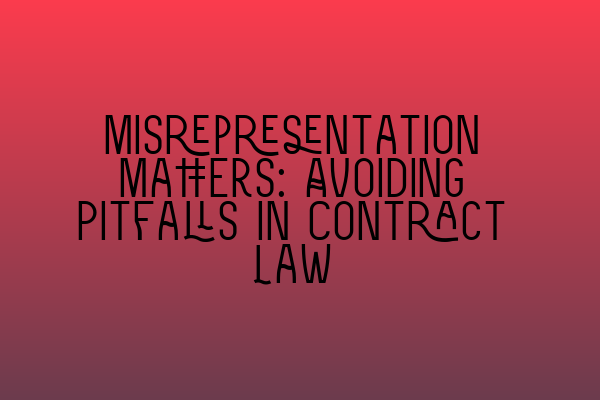Misrepresentation Matters: Avoiding Pitfalls in Contract Law
Welcome to the SQE Contract Law blog, where we dive deep into various topics to help aspiring solicitors navigate the complex world of contract law. In this article, we will be discussing the important concept of misrepresentation in contracts and how to avoid common pitfalls. Understanding misrepresentation is crucial for any solicitor, as it forms the basis for potential legal disputes and can have significant financial implications for clients.
What is Misrepresentation?
Misrepresentation occurs when one party makes a false statement of fact that induces the other party to enter into a contract. This false statement can be made through words, actions, or even silence when there is a duty to disclose information. The misrepresentation must be a material factor in the other party’s decision to enter into the contract.
There are three main types of misrepresentation:
- Fraudulent Misrepresentation: This occurs when a party makes a statement knowingly or without belief in its truth, with the intention to deceive the other party.
- Negligent Misrepresentation: This occurs when a party makes a statement without adequate care and reasonable grounds for believing it to be true.
- Innocent Misrepresentation: This occurs when a party makes a false statement, but honestly believes it to be true and had reasonable grounds for that belief.
Now that we have a basic understanding of misrepresentation, let’s explore some key areas where misrepresentation can arise and how to avoid them.
1. Contracts in Business Transactions
In business transactions, misrepresentation can sometimes occur when parties provide false information about their products, services, financial status, or future projections. To avoid such pitfalls, it is essential to conduct thorough due diligence and verify the accuracy of the information provided. We recommend seeking the assistance of experienced solicitors who can guide you through the process and help identify any potential misrepresentation issues.
2. Consumer Contracts
Misrepresentation can also be prevalent in consumer contracts, where companies often make exaggerated claims or fail to disclose important information. As a solicitor, it is crucial to review and analyze contracts from the consumer’s perspective to identify any potential misrepresentation and protect your client’s interests. Remember, consumers deserve fair and transparent contracts.
3. Online Contracts
The rise of e-commerce has brought about a new set of challenges in contract law. Misrepresentation in online contracts can occur through misleading product descriptions, false advertising, or hidden terms and conditions. As a solicitor, it is crucial to thoroughly review online contracts and ensure that they comply with consumer protection laws. Consider engaging an SEO expert to optimize your client’s website and ensure clear and accurate information is provided to users.
4. The Importance of Contractual Disclaimers
Contractual disclaimers can be an effective way to limit liability for misrepresentation claims. However, it is important to note that not all disclaimers are enforceable. As a solicitor, you must carefully draft and review contractual disclaimers to ensure they meet legal requirements and provide adequate protection for your client.
Now that we have discussed some key areas where misrepresentation can arise, let’s take a look at some related articles for further reading:
- SQE 1 Practice Exam Questions
- SQE 1 Practice Mocks FLK1 FLK2
- SQE 2 Preparation Courses
- SQE 1 Preparation Courses
- SRA SQE Exam Dates
Conclusion
Misrepresentation is a crucial concept in contract law, and as a solicitor, it is important to navigate this area with expertise and caution. By understanding the various types of misrepresentation and being vigilant in contract analysis, you can help your clients avoid costly disputes and protect their legal rights. Remember, seeking the guidance of experienced solicitors is essential for successful contract negotiation, drafting, and dispute resolution.
We hope this article has provided valuable insights into misrepresentation matters in contract law. If you have any questions or would like further assistance with contract law matters, feel free to reach out to our team at SQE Contract Law. We are here to help!
